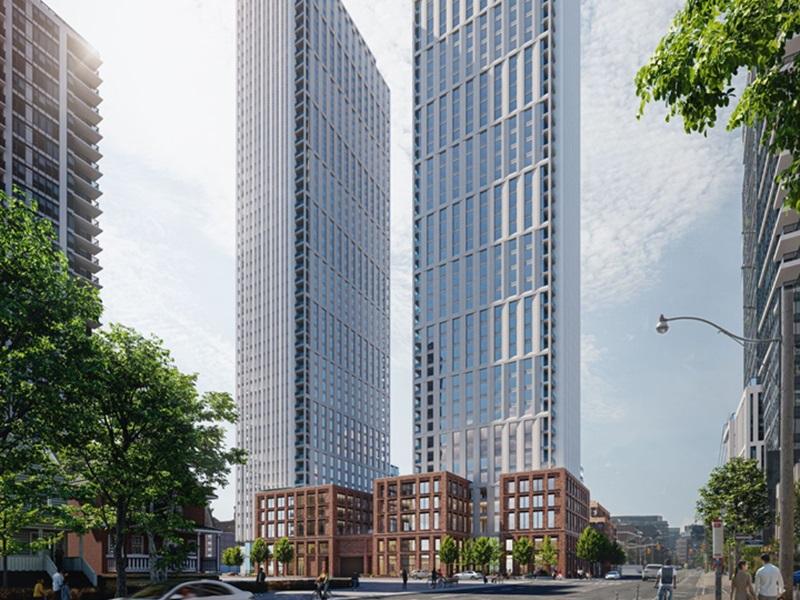
Broccolini will develop, build, own and property manage a 379,000-square-foot distribution centre for Lactalis Canada Inc. in Oshawa.
The project at 1680 Thornton Rd. N., part of the growing Northwood Business Park, has broken ground and is scheduled to open in late 2024.
Lactalis Canada is a subsidiary of France-based Lactalis Group and is behind such dairy brands as Cracker Barrel, Black Diamond, Balderson, Astro and Lactantia. The company has signed a long-term lease for the new facility, which will become Lactalis Group’s largest distribution centre in the world.
“We are seeing a lot of demand from users who, more so than in the past, are actively in the market early on in the process,” Broccolini director of real estate development Toni Wodzicki told RENX.
“They've learned in the last five years with the rate that some rents have escalated that if they can get in the market early enough, and they have specialized needs, they can work with a group like ours to find a solution that's more specialized and not just spec.”
The Oshawa building will consolidate multiple shipping locations used to service Lactalis Canada’s cheese and tablespreads category, including an internally operated Belleville, Ont., distribution centre, into a central, modern facility to accommodate the company’s long-term growth while increasing capacity and efficiency.
The lease agreement for the GKC Architecture and Design-designed building was facilitated by CBRE.
The centre is expected to create approximately 80 jobs and will be able to store up to 60,000 pallets in both cooler and freezer environments.
Building will have several green features
Environmental, social and governance considerations are currently playing a bigger role in industrial real estate development, especially among institutional investors and users with specialized needs.
The Oshawa facility will be zero-carbon ready, with the potential to be Zero Carbon Building certified, as are all new Broccolini industrial developments. It will also incorporate a number of other environmentally friendly features.
The use of energy-efficient lighting controls, equipment and high insulation values will reduce the power load imposed on the refrigeration system.
Heat generated from the refrigeration system will be fully reclaimed and used to heat the facility’s offices and melt snow on the truck apron.
A white roof will reduce the heat island effect and solar panels that can be installed on the roof in a future phase would provide renewable power to partially or completely offset reliance on the power grid.
Broccolini has a large industrial pipeline
The Oshawa distribution centre for Lactalis Canada is just one of several industrial developments Montreal-headquartered Broccolini has underway or has future capacity for in Quebec and Ontario.
Other projects scheduled for completion next year include: a million-square-foot Amazon distribution centre in Cambridge, Ont.; and a 140,000-square-foot commercial warehouse and CAT remanufacturing facility in Bradford, Ont.
The 74-year-old, third-generation family-owned business has a pipeline of more than 2,300 acres of land with the potential to develop more than 20 million square feet of industrial space.
“Given our expertise in development and construction, and some of the relationships we’ve built with some leading global companies, we've been quite tactical about finding near-term, large-scale development sites in secondary and tertiary Ontario markets,” Wodzicki noted.
“We don't have plans to develop on spec on those sites, but to be patient and find the right partners for them.”
Speculative and design-build developments
Broccolini is speculatively developing about 700,000 square feet of industrial space and also has numerous design-build projects totalling a few million square feet under development.
“We're generally a little bit more cautious on spec development right now, but it is case by case,” Wodzicki said. “It's dependent on the market and the site.
“In Montreal we currently have one project under development on spec and in Toronto we have two. We do not have any in what I would consider secondary and tertiary markets.”
Wodzicki said there’s a growing appetite from companies to have buildings designed specifically for their needs which they can acquire and own.
Broccolini’s position as a privately owned builder, developer, fund manager and property manager gives it flexibility on how it approaches the market and the ways it can accommodate the needs of occupiers.
“We own and manage over 21 million square feet of real estate between Quebec and Ontario, but we've built over 50 million square feet of industrial space,” Wodzicki said.
“Some of that is third-party construction because that is also an element of our business.
“But from our development side, we can certainly be nimble and flexible in terms of the solutions we can provide our clients.”
Industrial real estate outlook
Wodzicki said there has been a resurgence in manufacturing in Ontario and Quebec, particularly in the automotive and food sectors, so it’s not just distribution and logistics centres driving industrial real estate demand.
High immigration numbers, especially to major Canadian cities, should ensure continued demand for industrial space as more people will need more goods in a timely manner.
The slow municipal approval process in many Ontario markets has delayed development applications and, in turn, constrained supply.
There’s been significant industrial rent escalation over the past five years as demand far outstripped supply, but the market seems to be moderating.
“As the market begins to stabilize and get to a more natural demand and supply balance, you will see a flight to quality if the tenants have choice, which for the past five years many tenants haven’t, so they were forced into renewal scenarios,” Wodzicki said.
“I think what you might start seeing, and why we remain bullish on our ability to deliver new projects, is that higher A-class rents will hold.
"But what you might start to see is a higher rental spread between A-class and older-generation product.”










